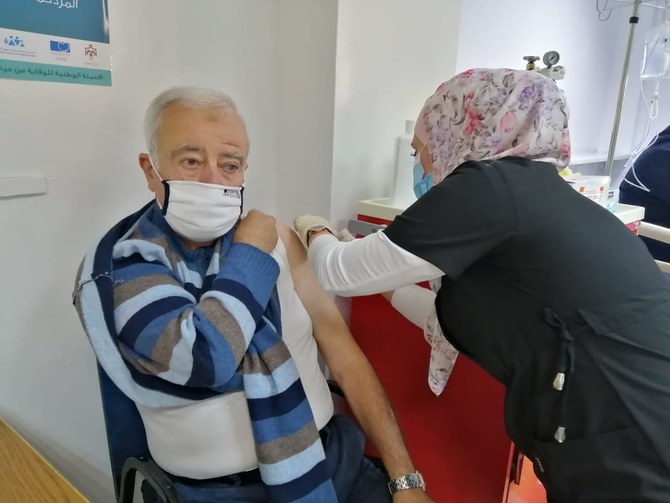AMMAN: An 87-year-old former army physician on Wednesday received the first shot in Jordan’s coronavirus disease (COVID-19) vaccination program.
Retired Lt. Gen. Dawood Hanania was given his jab at 8 a.m. at a vaccination center in the Jubaihah neighborhood of the capital Amman, signaling the start of a mass immunization effort to curb the spread of the virus that has killed more than 4,000 people in Jordan.
Hanania, a former Royal Medical Services director, told national news agency Petra: “Jordanians are now en route out of the pandemic.” He said that after consulting with international research centers and had been “strongly” advised to take the vaccine.
In preparation for the rollout of its vaccination program, Jordan launched an online platform for people to register for jabs.
Brig. Gen. Mazen Faraiah, head of the department responsible for COVID-19-related issues at the National Center for Security and Crisis Management, said 68,000 people would receive the vaccine in the campaign’s first phase, adding that 201,144 had already registered for the jab.
Health officials are aiming to inoculate about 2 million of Jordan’s 10 million population through the nationwide vaccination drive.
“The campaign is progressing steadily and smoothly,” said Health Minister Nathir Obeidat, adding that around 5,000 people every day would receive shots at the country’s 29 vaccination centers. Previously the minister said that the elderly, doctors, and nurses would be first in line for the vaccine.
Obeidat recently pointed out that Jordan’s Prime Minister Bisher Al-Khasawneh and several other members of the government had received the China-UAE Sinopharm vaccine during its testing phase.
“The vaccines that have been bought for the vaccination campaign in the Kingdom are all safe and effective … I myself took the vaccine,” he said, urging more Jordanians to come forward.
Jordan received its first shipments of Sinopharm on Saturday and the Pfizer-BioNTech COVID-19 vaccine on Monday – the two vaccines so far approved by the Jordan Food and Drug Administration for emergency use.
Obeidat said that the amounts of contracted COVID-19 vaccines would be enough to treat 20 percent of the country’s population, and that there was no ceiling for ordering more if the demand was there. In December, he noted that the vaccine would be given free of charge to foreign residents as well as Jordanians.
Abu Ahmad, who is in his 70s and received the COVID-19 vaccine at a center in Salt city, about 15 km west of Amman, told Arab News: “I feel safer now after taking the shot. I want to live the remaining years of my life with no fear of the corona.”
Jordan has to date recorded 309,846 COVID-19 cases and 4,076 virus-related deaths.



















